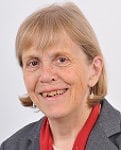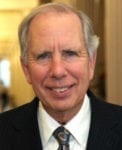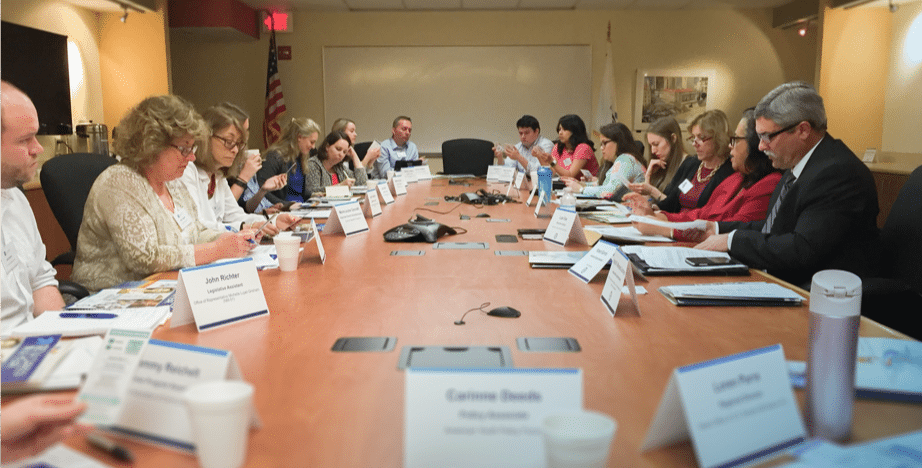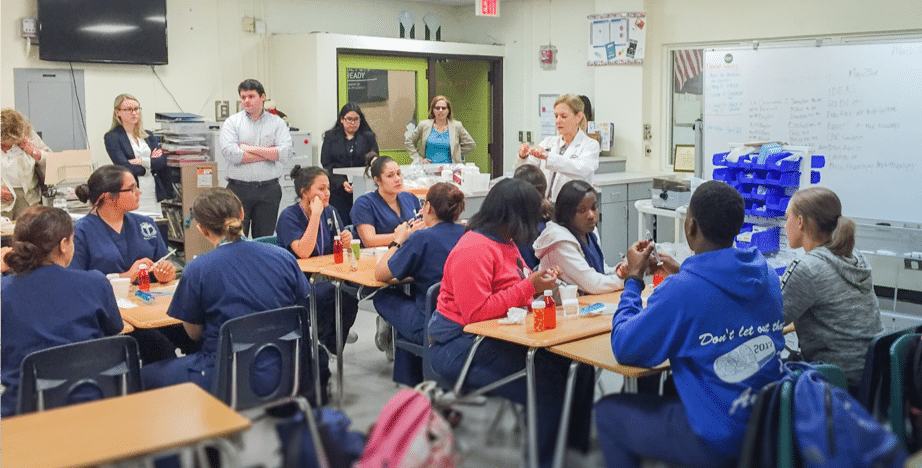Overview
As we look for strategies to increase postsecondary credential attainment for all students, we recognize that special attention should be paid to the needs of first-generation college students from low-income homes (FGLI). Given the difficulty of classifying this group of students, we acknowledge and hope to explore further the ways in which “first-generation” is defined, as well as other sub-categorizations that must be considered in addressing the needs of this population, such as a student’s race, country of birth, language proficiency, school quality, and geographic location.
This discussion group, explored the ways in which policy and practice can better support FGLI students. FGLI students often face unique and significant barriers to educational attainment, and on average have lower rates of postsecondary enrollment and persistence than their more affluent peers with parents who went to college.
Presenter Biographies
 Ann Coles is Senior Fellow for College Access Programs. In this role, she uses her extensive knowledge of research and expertise on a wide rage of college access issues to inform the work of uAspire staff. She also is a Senior Associate at the Institute for Higher Education Policy in Washington, DC, and consults nationally on college access and success issues. Previously, Ann served as Senior Vice President of TERI where she provided leadership for national and local college access programs, including the Pathways to College Network and the Boston Higher Education Partnership. Her recent publications includeWho’s Making It: The Academic Achievement of Recent Boston Public School Graduates in the Early College Years and Removing Roadblocks to Rigor: Linking Academic and Social Supports to Ensure College Readiness and Success. Ann has a doctorate from the Harvard Graduate School of Education.
Ann Coles is Senior Fellow for College Access Programs. In this role, she uses her extensive knowledge of research and expertise on a wide rage of college access issues to inform the work of uAspire staff. She also is a Senior Associate at the Institute for Higher Education Policy in Washington, DC, and consults nationally on college access and success issues. Previously, Ann served as Senior Vice President of TERI where she provided leadership for national and local college access programs, including the Pathways to College Network and the Boston Higher Education Partnership. Her recent publications includeWho’s Making It: The Academic Achievement of Recent Boston Public School Graduates in the Early College Years and Removing Roadblocks to Rigor: Linking Academic and Social Supports to Ensure College Readiness and Success. Ann has a doctorate from the Harvard Graduate School of Education.
 Khadish O. Franklin is the Associate Director and Senior Researcher at the Pell Institute for the Study of Opportunity in Higher Education. He brings to the Council for Opportunity in Higher Education a deep knowledge of the impacts of higher education policy and institutional factors leading to postsecondary success for first generation, low-income, and minority students. He currently serves as a Co-PI for an i-3 grant entitled, Using Data to Inform College Access Programming being implemented in low-income high priority schools in Pennsylvania and Kentucky; and manages the development of a longitudinal data solution that integrates data to help educators make informed decisions regarding student achievement and college access and success. Franklin earned a Master of Science degree in higher education from the Florida State University and a B.A. in communication from the University of Arkansas, Fayetteville.
Khadish O. Franklin is the Associate Director and Senior Researcher at the Pell Institute for the Study of Opportunity in Higher Education. He brings to the Council for Opportunity in Higher Education a deep knowledge of the impacts of higher education policy and institutional factors leading to postsecondary success for first generation, low-income, and minority students. He currently serves as a Co-PI for an i-3 grant entitled, Using Data to Inform College Access Programming being implemented in low-income high priority schools in Pennsylvania and Kentucky; and manages the development of a longitudinal data solution that integrates data to help educators make informed decisions regarding student achievement and college access and success. Franklin earned a Master of Science degree in higher education from the Florida State University and a B.A. in communication from the University of Arkansas, Fayetteville.
 Noël Harmon is Senior Vice President, Strategic Partnerships, for Say Yes To Education. In this capacity, she plays a central role in the organization’s efforts to forge partnerships and to raise start-up capital – including from foundations and corporations. Among the goals of her work at Say Yes is to expand the Say Yes citywide strategy to additional communities. In seeking partnerships on behalf of Say Yes, Harmon works to identify and cultivate entities that share the organization’s goals of high school graduation and post-secondary completion for all public school students in the communities that it serves. She also leads the organization’s development strategy. Harmon holds a PhD in Higher Education and a BA in English from the University of Iowa, and a MA in Student Affairs Administration from Ball State University.
Noël Harmon is Senior Vice President, Strategic Partnerships, for Say Yes To Education. In this capacity, she plays a central role in the organization’s efforts to forge partnerships and to raise start-up capital – including from foundations and corporations. Among the goals of her work at Say Yes is to expand the Say Yes citywide strategy to additional communities. In seeking partnerships on behalf of Say Yes, Harmon works to identify and cultivate entities that share the organization’s goals of high school graduation and post-secondary completion for all public school students in the communities that it serves. She also leads the organization’s development strategy. Harmon holds a PhD in Higher Education and a BA in English from the University of Iowa, and a MA in Student Affairs Administration from Ball State University.
 Rafael Heller is Principal Policy Analyst at Jobs for the Future, where he leads efforts to synthesize new research in secondary and post-secondary education and explore its implications for policy and practice. Prior to joining JFF in 2014, Dr. Heller was an independent consultant for many years, serving as a writer, editor, and strategic counsel to numerous education advocacy groups, foundations, associations, and other organizations. Previously, he was a senior policy associate at the Alliance for Excellent Education, directing a range of projects focused on improving literacy instruction in the nation’s middle and high schools. Earlier in his career, he spent several years teaching writing, rhetoric, and English language, including a stint as professor and English department chair at the Universidad San Francisco de Quito, Ecuador. Dr. Heller holds a Bachelor’s degree in English from Oberlin College, a Master’s in Education from the Harvard Graduate School of Education, and a Ph.D. in English & Education from the University of Michigan.
Rafael Heller is Principal Policy Analyst at Jobs for the Future, where he leads efforts to synthesize new research in secondary and post-secondary education and explore its implications for policy and practice. Prior to joining JFF in 2014, Dr. Heller was an independent consultant for many years, serving as a writer, editor, and strategic counsel to numerous education advocacy groups, foundations, associations, and other organizations. Previously, he was a senior policy associate at the Alliance for Excellent Education, directing a range of projects focused on improving literacy instruction in the nation’s middle and high schools. Earlier in his career, he spent several years teaching writing, rhetoric, and English language, including a stint as professor and English department chair at the Universidad San Francisco de Quito, Ecuador. Dr. Heller holds a Bachelor’s degree in English from Oberlin College, a Master’s in Education from the Harvard Graduate School of Education, and a Ph.D. in English & Education from the University of Michigan.
 Beth Olivares currently serves as Dean for Diversity Initiatives, Faculty Development and Diversity Officer, Director of the David T. Kearns Center for Leadership and Diversity in Arts, Sciences and Engineering, and Faculty Development and Diversity Officer in Arts, Sciences and Engineering at the University of Rochester. As Director of the Kearns Center, she has developed educational pipeline programs that provide educational opportunity to students from middle school through the doctoral degree. Over a thousand high school, undergraduate and graduate students are served each year by the Center’s programs, which include Upward Bound, Upward Bound Math/Science, two College Prep Centers located in the Rochester City School District, the Ronald E. McNair Post-baccalaureate Achievement Program and the Xerox Scholars program for engineering students. In June 2015, she received a Presidential Award for Excellence in Science, Mathematics and Engineering Mentoring from President Obama, for her work increasing the number of underrepresented minority students earning doctoral degrees in STEM fields.
Beth Olivares currently serves as Dean for Diversity Initiatives, Faculty Development and Diversity Officer, Director of the David T. Kearns Center for Leadership and Diversity in Arts, Sciences and Engineering, and Faculty Development and Diversity Officer in Arts, Sciences and Engineering at the University of Rochester. As Director of the Kearns Center, she has developed educational pipeline programs that provide educational opportunity to students from middle school through the doctoral degree. Over a thousand high school, undergraduate and graduate students are served each year by the Center’s programs, which include Upward Bound, Upward Bound Math/Science, two College Prep Centers located in the Rochester City School District, the Ronald E. McNair Post-baccalaureate Achievement Program and the Xerox Scholars program for engineering students. In June 2015, she received a Presidential Award for Excellence in Science, Mathematics and Engineering Mentoring from President Obama, for her work increasing the number of underrepresented minority students earning doctoral degrees in STEM fields.
 Lindsay C. Page is an assistant professor of research methodology at the University of Pittsburgh School of Education. Her work focuses on quantitative methods and their application to questions regarding the effectiveness of educational policies and programs across the pre-school to postsecondary spectrum. Much of her recent work has focused on investigating potential solutions to “summer melt,” the phenomenon that college-intending students fail to transition successfully from high school to college. Lindsay’s research has been published in a variety of academic journals, and she is the co-author of a book on summer melt. Her work has received significant media attention, having been covered by outlets such as Morning Edition and Marketplace on National Public Radio and in the New York Times, among others. She holds a doctorate in quantitative policy analysis and master’s degrees in statistics and in education policy from Harvard University.
Lindsay C. Page is an assistant professor of research methodology at the University of Pittsburgh School of Education. Her work focuses on quantitative methods and their application to questions regarding the effectiveness of educational policies and programs across the pre-school to postsecondary spectrum. Much of her recent work has focused on investigating potential solutions to “summer melt,” the phenomenon that college-intending students fail to transition successfully from high school to college. Lindsay’s research has been published in a variety of academic journals, and she is the co-author of a book on summer melt. Her work has received significant media attention, having been covered by outlets such as Morning Edition and Marketplace on National Public Radio and in the New York Times, among others. She holds a doctorate in quantitative policy analysis and master’s degrees in statistics and in education policy from Harvard University.
 Jennifer Smith currently serves as the Director of the University Leadership Network (ULN) at The University of Texas at Austin. As part of the university’s initiative to increase the four-year graduation rate, she was appointed to provide a unique student experience based on leadership, professional development, and experiential learning combined with the opportunity to earn a significant scholarship. Jennifer was instrumental in the development and implementation of a number student success initiatives including the University Leadership Network, the Texas Interdisciplinary Plan Mentor Academy, and the College of Natural Sciences Peer Leader Academy. Jennifer has been a contributing staff member in the College of Natural Sciences at UT Austin since 2003, and has served as an undergraduate instructor since 2011. Jennifer’s research and practice center on leadership, incentive-based scholarship, undergraduate peer mentoring, and the experiences of underrepresented undergraduate populations.
Jennifer Smith currently serves as the Director of the University Leadership Network (ULN) at The University of Texas at Austin. As part of the university’s initiative to increase the four-year graduation rate, she was appointed to provide a unique student experience based on leadership, professional development, and experiential learning combined with the opportunity to earn a significant scholarship. Jennifer was instrumental in the development and implementation of a number student success initiatives including the University Leadership Network, the Texas Interdisciplinary Plan Mentor Academy, and the College of Natural Sciences Peer Leader Academy. Jennifer has been a contributing staff member in the College of Natural Sciences at UT Austin since 2003, and has served as an undergraduate instructor since 2011. Jennifer’s research and practice center on leadership, incentive-based scholarship, undergraduate peer mentoring, and the experiences of underrepresented undergraduate populations.
 Bob Templin, President Emeritus of Northern Virginia Community College, currently serves as a Senior Fellow in the College Excellence Program at The Aspen Institute and Professor of Adult and Community College Education at North Carolina State University. His work focuses on continuing his national community college reform work by concentrating on the preparation of the next generation of community college leaders. Bob served as the fourth president of Northern Virginia Community College (NOVA) from 2002 to 2015. Under Templin’s leadership the college created a strategic plan to increase college access and student success for 25,000 additional students drawn primarily from low-income and immigrant communities through a collective action strategy that champions closer working relationships between NOVA and the region’s high schools, community-based non-profit organizations, universities, and employers. Since 2010, Templin has served as the Chairman of the Board of Directors of Achieving the Dream, a national community college reform network. Shortly following the White House Summit on Community Colleges in 2010, Templin was named a “Champion of Change” by the White House.
Bob Templin, President Emeritus of Northern Virginia Community College, currently serves as a Senior Fellow in the College Excellence Program at The Aspen Institute and Professor of Adult and Community College Education at North Carolina State University. His work focuses on continuing his national community college reform work by concentrating on the preparation of the next generation of community college leaders. Bob served as the fourth president of Northern Virginia Community College (NOVA) from 2002 to 2015. Under Templin’s leadership the college created a strategic plan to increase college access and student success for 25,000 additional students drawn primarily from low-income and immigrant communities through a collective action strategy that champions closer working relationships between NOVA and the region’s high schools, community-based non-profit organizations, universities, and employers. Since 2010, Templin has served as the Chairman of the Board of Directors of Achieving the Dream, a national community college reform network. Shortly following the White House Summit on Community Colleges in 2010, Templin was named a “Champion of Change” by the White House.




